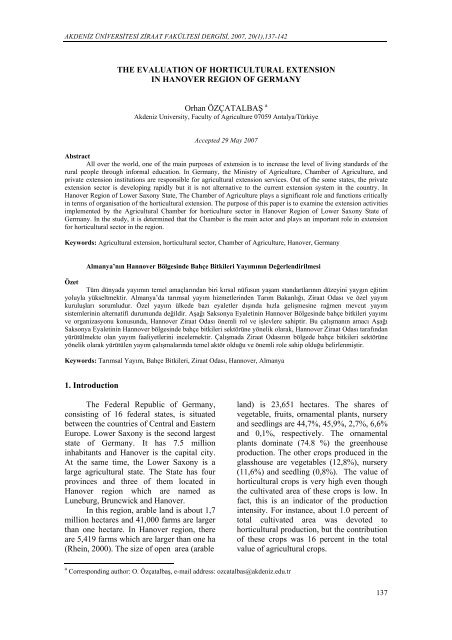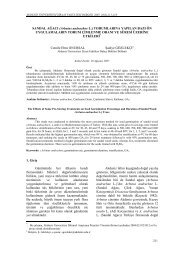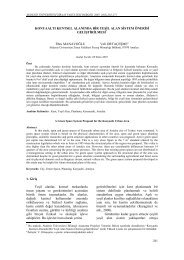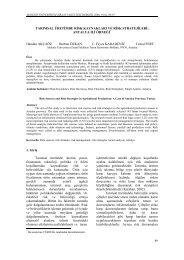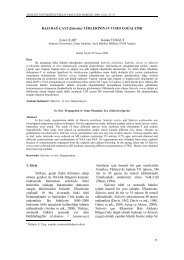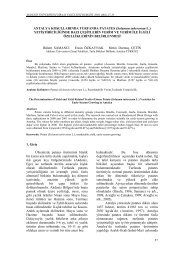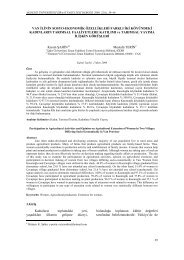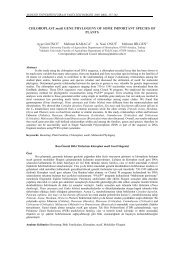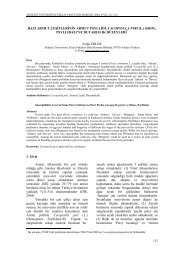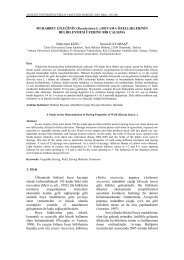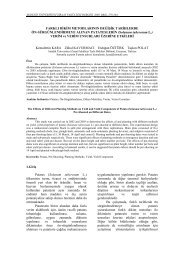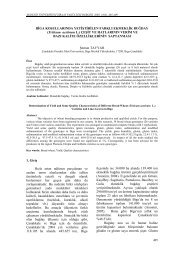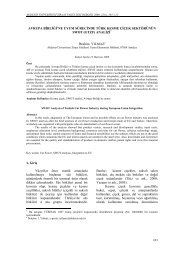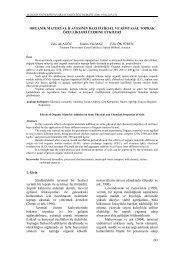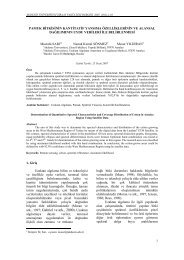THE EVALUATION OF HORTICULTURAL EXTENSION IN ...
THE EVALUATION OF HORTICULTURAL EXTENSION IN ...
THE EVALUATION OF HORTICULTURAL EXTENSION IN ...
Create successful ePaper yourself
Turn your PDF publications into a flip-book with our unique Google optimized e-Paper software.
AKDENİZ ÜNİVERSİTESİ ZİRAAT FAKÜLTESİ DERGİSİ, 2007, 20(1),137-142<strong>THE</strong> <strong>EVALUATION</strong> <strong>OF</strong> <strong>HORTICULTURAL</strong> <strong>EXTENSION</strong><strong>IN</strong> HANOVER REGION <strong>OF</strong> GERMANYOrhan ÖZÇATALBAŞ aAkdeniz University, Faculty of Agriculture 07059 Antalya/TürkiyeAccepted 29 May 2007AbstractAll over the world, one of the main purposes of extension is to increase the level of living standards of therural people through informal education. In Germany, the Ministry of Agriculture, Chamber of Agriculture, andprivate extension institutions are responsible for agricultural extension services. Out of the some states, the privateextension sector is developing rapidly but it is not alternative to the current extension system in the country. InHanover Region of Lower Saxony State, The Chamber of Agriculture plays a significant role and functions criticallyin terms of organisation of the horticultural extension. The purpose of this paper is to examine the extension activitiesimplemented by the Agricultural Chamber for horticulture sector in Hanover Region of Lower Saxony State ofGermany. In the study, it is determined that the Chamber is the main actor and plays an important role in extensionfor horticultural sector in the region.Keywords: Agricultural extension, horticultural sector, Chamber of Agriculture, Hanover, GermanyAlmanya’nın Hannover Bölgesinde Bahçe Bitkileri Yayımının DeğerlendirilmesiÖzetTüm dünyada yayımın temel amaçlarından biri kırsal nüfusun yaşam standartlarının düzeyini yaygın eğitimyoluyla yükseltmektir. Almanya’da tarımsal yayım hizmetlerinden Tarım Bakanlığı, Ziraat Odası ve özel yayımkuruluşları sorumludur. Özel yayım ülkede bazı eyaletler dışında hızla gelişmesine rağmen mevcut yayımsistemlerinin alternatifi durumunda değildir. Aşağı Saksonya Eyaletinin Hannover Bölgesinde bahçe bitkileri yayımıve organizasyonu konusunda, Hannover Ziraat Odası önemli rol ve işlevlere sahiptir. Bu çalışmanın amacı AşağıSaksonya Eyaletinin Hannover bölgesinde bahçe bitkileri sektörüne yönelik olarak, Hannover Ziraat Odası tarafındanyürütülmekte olan yayım faaliyetlerini incelemektir. Çalışmada Ziraat Odasının bölgede bahçe bitkileri sektörüneyönelik olarak yürütülen yayım çalışmalarında temel aktör olduğu ve önemli role sahip olduğu belirlenmiştir.Keywords: Tarımsal Yayım, Bahçe Bitkileri, Ziraat Odası, Hannover, Almanya1. IntroductionThe Federal Republic of Germany,consisting of 16 federal states, is situatedbetween the countries of Central and EasternEurope. Lower Saxony is the second largeststate of Germany. It has 7.5 millioninhabitants and Hanover is the capital city.At the same time, the Lower Saxony is alarge agricultural state. The State has fourprovinces and three of them located inHanover region which are named asLuneburg, Bruncwick and Hanover.In this region, arable land is about 1,7million hectares and 41,000 farms are largerthan one hectare. In Hanover region, thereare 5,419 farms which are larger than one ha(Rhein, 2000). The size of open area (arableland) is 23,651 hectares. The shares ofvegetable, fruits, ornamental plants, nurseryand seedlings are 44,7%, 45,9%, 2,7%, 6,6%and 0,1%, respectively. The ornamentalplants dominate (74.8 %) the greenhouseproduction. The other crops produced in theglasshouse are vegetables (12,8%), nursery(11,6%) and seedling (0,8%). The value ofhorticultural crops is very high even thoughthe cultivated area of these crops is low. Infact, this is an indicator of the productionintensity. For instance, about 1.0 percent oftotal cultivated area was devoted tohorticultural production, but the contributionof these crops was 16 percent in the totalvalue of agricultural crops.a Corresponding author: O. Özçatalbaş, e-mail address: ozcatalbas@akdeniz.edu.tr137
The Evaluation of Horticultural Extension in Hanover Region of GermanyIt is well known that intensiveproduction such as horticulture requiresmuch more technical knowledge comparedto other agricultural crops. For this reason,extension activities for the horticultural plantproduction requires relatively different (i.e.more information support) approach tofarming comparing to the other agriculturalcrops. Furthermore, there is a very closerelationship between net income andagricultural support policy. In the line ofagricultural policy, the Federal governmentrelatively allocates more supports tohorticultural growers. Government supportper hectare is equal to half of the value ofagricultural crops. It is therefore the net farmincome per hectare is the sum of the totalcrop value and government support on thebasis area.2. Horticultural Extension in the RegionAll over the world, one of the mainpurposes of extension is to increase the levelof living standards of the rural peoplethrough informal education (Ozcatalbas andGurgen, 1998).Extension has helped farmers’ needson agricultural information and responded tonew market opportunities (Snapp, 2004). InGermany, agricultural extension services areprovided by the Ministry of Agriculture, andChamber of Agriculture and several privateextension institutions. The private extensionsystem (or services) is developing rapidly,but it is not alternative to the currentextension system in the country.Extension activities for horticulturecover vegetables, fruits and ornamentalplants. Horticulture is one of the majoragricultural activities in Hanover region.Generally rural and agricultural extensionand also horticultural extension services areunder the responsibility of the Chamber ofAgriculture in Hanover and Lower Saxony.Extension system, implemented by the stateis accepted as one of the best in Germany(Bruns, 1999).Extension service for horticulturesector is mainly carried out by the Chamberof Agriculture of Hanover. It can be named“farmer-union based extension system” andapplied in both Hanover Region and LowerSaxony state. The Chamber of Agricultureof Hanover (LandWirtschaftsKammerHannover-LWK), located in Hanoverprovince is responsible for extensionactivities in three provinces. The Chamberis the biggest European chamber with 1350employees, around 400 staff work in theMain Office (Centrum) of the Chamber inHanover (Rhein, 2000). The majority ofstaff work in the agencies of county, districtagencies and forestry agencies and researchinstitutes, education and fieldexperimentation (Rhein, 2000; Märkisch,1999).The Chamber has 6,307 members andabout 47,8 percent of the member producevegetables. The shares of growers producingfruit, ornamental plants, nursery andseedling are 27.1, 17.5, 7.1, and 0.5 %,respectively. The Chamber has 3 institutes, 5district offices, 26 county offices and 12forestry offices. These institutions play animportant role in terms of implementationof extension activities.The Chamber aims to improve "theagriculture and living standards of farmersaccording to the interests of society".Education and advanced training coursescalled "green professions" as well as variousadvisory services are the most importantduties of the Chamber. The most importanttasks and functions of the Chamber, can bebriefly stated as (Rhein, 2000; Ozcatalbas,2000):• to organise and apply extensionservices,• to train extension workers (in thecentre of training of Ahlem and MainCentrum of the Chamber for extensionworkers and farmers),• to conduct research (research instituteof Ahlemer and LUFA Hameln),• to provide contact among researchinstitutes,• to provide contact with universities(Hanover, Munich and Berlin) and• to improve contact with internationalresearch institutes (Denmark, TheNetherlands)138
O. ÖZÇATALBAŞ2.1. Role of the Ministry in ExtensionThe budget of the Chamber comesfrom subscriptions, fees and state subsidies.Many specialists are demanded by thegrowers for extension work and training andgrowers need to pay fee for these service.About 75% of the Chamber budget wasdevoted to staff salary. (Rhein, 2000).The Ministry of Agriculture supportsfinancially to the extension and researchactivities and contributes about half of theChamber’s total budget. In the sake of thissupport, the Chamber conducts someresearch studies in its own researchinstitutions and presents the research resultsto Ministry of Agriculture. The remainingpart of the Chamber’s budget comes fromextension services paid by growers (20%),annual grower fees (subscriptions-30,4%)and the Chamber own contribution (4,5%)(Rhein, 2000; Ozcatalbas, 2000).The functions of the Ministry in thenon-governmental extension organisationsystem are to support financially toextension service, to conduct Research andDevelopment (R&D) to organise fair andexhibitions as national and internationallevels to introduce and disseminate of newtechnologies, to act together with federalgovernment to apply common agriculturalpolicy, to develop national informationnetworks and to prepare infrastructure tojoin with the international informationnetworks. The generation (produce) andstorage of information are realised byFederal Ministry of Agriculture, LowerSaxony Ministry of Agriculture andChambers of Agriculture in order to conductand implement macro level plans and toprovide suitable atmosphere to the receiversduring the extension services.2.2. Extension Organisation in the RegionThe horticultural extensionorganisation of Hanover region can bedivided into two main fields (Rhein, 2000;Ozcatalbas, 2000):1. Horticultural extension (all horticulturalextension & research activities)2. Agricultural extension excludinghorticulture (extension is oriented only toagriculture but not horticulture)As it shown in Figure 1, The Chamberis divided into six departments. One of themost important departments is Horticultureand another crucial one is Education andExtension. This department is supported by26 county (Kreisstellen) offices and tworesearch institutes (Lufa Hameln &Ahlemer). The tasks of other departmentsare administrative and technical fields.DIRECTORD E P A R T M E N T S1- Horticulture(All horticultural extension &research activities)2- Education & Extension,Farm Economics(without horticulture)3- Crop Production & RegionalDevelopment4- Animal ProductionαHusbandry5- Forestry6- General Management (administrative)1-Horticultural Marketing - organisation and development2-Farm Economics - services, trade and rantability3-Ornamental4- Vegetable5-Horticultural Training6- Research Institute7. Fruit research station (in Jork)1-Marketing & organisation, agric.statistics2-Vocational training in horticulture, land, forestry & homeeconomics.3-Training&extension for agric.employeer, manager& women4-Demand subjects 5-Agricultural technology6-Extension for firmsResearch InstitutesLufa Hameln Ahlemer instituteFigure 1. The Horticultural Extension Organisation of the Chamber139
The Evaluation of Horticultural Extension in Hanover Region of Germany3. Horticultural Department in theChamberAs already discussed in the previoussection, the Chamber pays special attentionto the horticultural production. For thatreason horticultural extension activities areplanned and implemented by the Departmentof Horticulture which is located at the mainoffice of the Chamber. The role of theDepartment is crucial for horticulturalgrowers in Hanover region.The Department of Horticulture canbe seen in Figure 2. It has currently 130 staffof which 110 people are researchers and 20people are extension specialists, ten out of20 extension specialists work as a full-timebasis. They are permanently worked in theregion and are mobile with their cars. Fulltimeextension specialists try to determinegrowers’ problems at the farm level andproduce solutions for these problems. Aboutseven out of ten full-time extensionspecialists work in fruit (orchard) productionand three of them work in the ornamentalplants. The remaining extension specialistswork part time in extension andadministrative works.For example, two of the part timeextension staff work in vegetables. One ofthem is responsible for asparagus (spargel),which is one of the most important crops inthe Lower Saxony in terms of production,consumption, and profitability.3.1. Organization of the DepartmentThe head of Horticulture Departmenthas 12 units and two extension circles whichare called EDV-extension circle andHorticultural extension circle. The maintasks of EDV-Extension circle are tomanage communication network and toprovide connection between the Departmentand the growers. At the same time, thisextension circle provides connectionbetween the extension workers andresearchers. These are given below;I. The Units of Head of the Department1. Nursery2. Vegetable production, quality and watersaving,3. Intensive vegetable production and seedproduction techniques-methods,4. Asparagus and field vegetable,5. Horticultural production techniques andmethods,6. Quality control of vegetables and fruits,7. Ornamental plants,8.Intensive information for horticulturegrowers,9. Service productivity in horticulture,10. Farm economics and EDV,11. Retail trade and selling and12. Staff management.II. EDV –Extension circle has a role onconsultation,III. Horticultural Extension Circle has fivesubjects. These are;1. Production,2. Farm economics,3. Marketing,4. Extension and5. Production and marketing.HEAD <strong>OF</strong> <strong>THE</strong> DEPARTMENTExtension PersonsFull-timeextensionworkerPart-timeextensionworkerResearchersFruitOrnamentalVegetableNurseryAsparagusFigure 2. Distribution of staff of the Department140
O. ÖZÇATALBAŞThere is a specialist for each subjectin the extension circle. The main task ofHorticultural extension circle is to solveproblems of growers. If the problem can notbe solved at the extension circle, then theproblems are sent to the research institutes.In the region, horticultural researchactivities are implemented by the Universityof Hanover, Ministry of Agriculture, and theChamber which have horticultural researchinstitutes. However, the most importantresearch units belong to the Chamberfollowed by the university and the Ministryof Agriculture.3.2. The Strength of Linkage of the ChamberThe level of the relationships betweenthe farmers and the Chamber can be statedbetween ad-hoc and very strong. Accordingto this strength of linkage, The Chamber hasvery strong linkage with Ministry ofAgriculture of Lower Saxony, ResearchInstitutes of Ministry of Agriculture ofLower Saxony, University of HanoverForeign Research Institutes, ForeignUniversities and Other Chambers ofAgriculture in Germany (Schenk, 1999;Rhein,2000;Ozcatalbas,2000).The Chamberhas also a moderate-strong linkage withFederal Ministry of Agriculture andResearch Institutes of Federal Ministry ofAgriculture (Rhein, 2000).3.3. Fee-Paying System for ExtensionThe extension staffs are responsiblefor the extension activities in their area andusually visit farmers once or twice a weekwith respect to the characteristics of theproduction season. During these visits, theextension staffs make observations andconducts-interviews with growers. Thus theextension staffs have opportunity to see theproblems of farmers and determine solutionpossibilities at the farm level. The farmershave to pay membership fees (subscription)as annual basis to extension circle. Inaddition, farmers can ask the subject matterspecialists (SMS) of the Chamber to dealwith their urgent problems. If the extensionworker can solve the problems, he has to bepaid based on the time spent on the farmlevel. Furthermore, farmers can contact withextension staff by telephone and/or internetor farmers visit extension people in his/heroffice to receive agricultural information. Inthese cases again there is no need to pay feeby the farmers to the extension people.4. Training of Trainers and FarmersThe German training system inagriculture, especially practical training isbased on the German dual training system.Training institutions are universities,technical schools, DEULA institutes(Agricultural Teaching Centres), nationaland regional research institutes, etc.One of the key factors inimplementing extension is regular trainingwhich is fundamental to effective extension(Hayward, 1990). The regular training hasvery special role in the extension. InHanover region, training of trainers(extension staff) and farmers areimplemented by the Chamber. Trainingseminars oriented to farmers are organisedin various topics. These seminars generallylast 2 days, but some of them last one day orbetween 3 and 5 days. Farmers have to beregistered to participate these seminars andhave to pay seminar’s fee. The seminars aregenerally organised between January andFebruary, because agricultural activitiesbetween these dates are relatively low. Thetopics of seminars are crop selling,promotion, advertising, marketing, theprogram of Electronic Data Processing(EDV-Electronische Daten Verarbeitas) forbeginners internet-basic level, how to use(EDV) plant protection, horticulturalproduction techniques, social security andemployment, garden-landscape building,holidays information for women, studenttrips to international green week etc.5. Training of Farmers’ ChildrenThe training of farmers’ children(young farmes or future farmers) is carriedout by the Horticultural Department at themain office of the Chamber via internet andpublications. For this purpose, the Club of141
The Evaluation of Horticultural Extension in Hanover Region of GermanyFarmers’ children was established which isknown as PUK-Club (Pfiffiges undKunterbuntes rund um Pflanzen). The Clubhas always contacts with its members. Themain communication tools are PUK-ClubMagazine and its web page.This club targets young farmers whoare between 5 and 11 years old. Currently,the club has 100.000 members and itorganises various activities for the children.The club for example organises courseslasting 2 months for the children ofornamental growers. About 150 growers’children from the total 1108 ornamentalfarms located in Hanover region weretrained in 1990. Training topics are aboutthe environment, agricultural andhorticultural productions. The aim of thecourses is to: disseminate information toparents through their children trained in thehorticultural production and to traincandidate growers.6. ConclusionIn Hannover Region of lower SaxonyState, The role of the Chamber ofAgriculture is very important forhorticultural extension activities. Extensionservice for horticulture sector is mainlycarried out by the Chamber which named“farmer-union based extension systems”.The most important tasks of theChamber are to organise and implementextension services, to train extensionworkers, to conduct research, to makecontact with relevant institutes: Thefunctions of the Ministry of Agriculture areto support financially to extension services,to conduct research and development, toorganize fair and exhibitions, to act togetherwith federal government to implementcommon agricultural policy, to developinformation networks. The degree ofrelationships between the farmers and theChamber can be stated between ad-hoc andvery strong. This point is very important andit should be continued to increase of theextension efficiency.AcknowledgementsThe author would like to thank Prof.Dr. E.W. Schenk, Dr. P. Rhein, Dr. F. Brunsand Mr. N. Märkisch for contributions andcollaboration.ReferencesBruns, F., 1999. Interview notes, Councillor ofMinistry Food, Agriculture and Forestry ofLower Saxony. 28 October 1999, Address:Calenberger Str.2 30169 Hannover.Hayward, J.A., 1990. Agricultural Extension:TheWorld Bank`s Experience and Approaches.Global Consultation on AgriculturalExtension.4-8 Dec., 1989 Rome, FAO. Italy.Märkisch,N., 1999. Interview notes, Chamber ofAgriculture of Hannover (LWK),Department ofHorticulture, EDV-Extension Circle.(Landwirtschaftskammer Hannover AbteilungGartenbau-EDV-Beratung-BetriebswirtschaftAnsprechpartner Internet) 05 Nov. 1999-18January 2000. Address: Abteilung Gartenbau,Johannssenstraße 10 D-30159 Hannover.Ozcatalbas, O., ve Gürgen, Y., 1998. AgriculturalExtension and Communication. Baki Publ.ISBN: 975-72024-02-3, Adana.Ozcatalbas, O., 2000. Horticultural InformationSystem and Extension Organization inHannover Region, Germany. HannoverUniversity, Horticultural Faculty, Institute ofHorticultural Economics. Hanover, Germany(unpublished report).Rhein,P., 2000. Interview notes, Chamber ofAgriculture of Hannover (LWK), Head ofDepartment of Horticulture,(Landwirtschaftsdirector, Leiter der AbteilungGartenbau). 18-24 January 2000. AbteilungGartenbau, Johannssenstraße 10 D-30159HannoverSchenk,E.W., 1999. Interview notes, Head of Instituteof Horticultural Economics. October 1999-January 2000. Universitaet Hannover Institut fürGartenbauökonomie, Herrenhauser Str. 2.D-30419 Hannover.Snapp, S.S., 2004. Innovations in Extension fromMalawi. American Society for HorticulturalScience, Horttechnology, January-March 2004(Vol14,No.1).Uhte,R., 2000. Interview notes, Head of Society forEconomics and Business Management inHorticulture. O5-12 January 2000. UniversitaetHannover Institut für Gartenbauökonomie,Herrenhauser Str. 2. D-30419 Hannover.142


